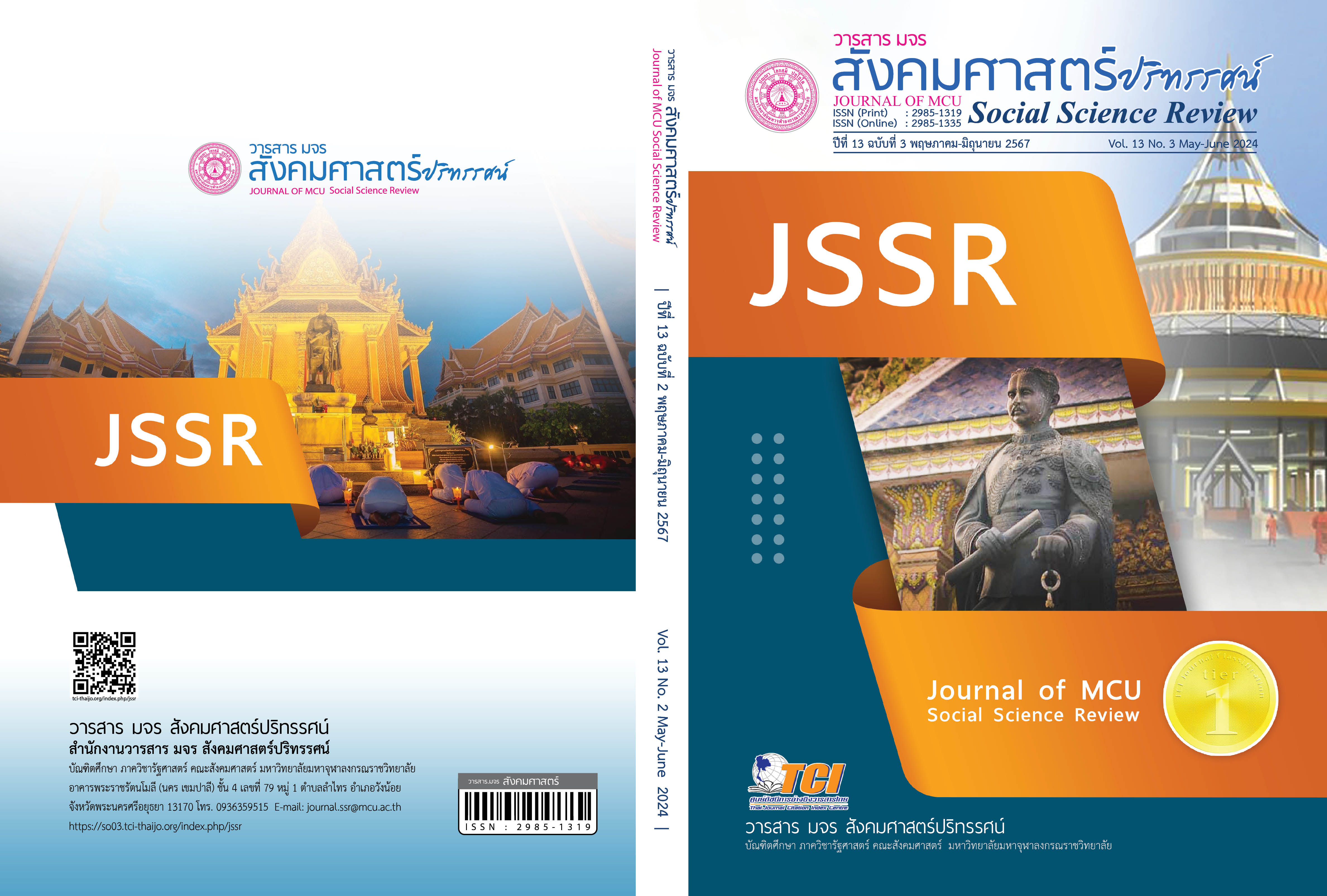แนวทางการจัดการความเสี่ยงสำหรับธุรกิจสปา
คำสำคัญ:
การจัดการความเสี่ยง, สปา, ธุรกิจเพื่อสุขภาพบทคัดย่อ
สปา และนวดแผนไทยเป็นธุรกิจที่ได้รับความนิยม และมีชื่อเสียงอย่างมาก เนื่องจากประเทศไทยมีศักยภาพสูงทั้งในด้านของทรัพยากรบุคคล ทรัพยากรธรรมชาติ และภูมิปัญญาที่มีเอกลักษณ์ส่งผลให้สปาไทยมีชื่อโด่งดังไปทั่วโลก อย่างไรก็ตาม ธุรกิจสปาเป็นอีกหนึ่งธุรกิจที่ต้องเจอกับความเสี่ยงมากมายทั้งที่หลีกเลี่ยงได้ และหลีกเลี่ยงไม่ได้จากปัจจัยภายใน และภายนอก ซึ่งอาจก่อให้เกิดความเสี่ยงสู่ภาวะวิกฤต อาทิเช่น ด้านบุคคล ด้านเศรษฐกิจ ด้านสินทรัพย์ ด้านการเงิน ด้านกระบวนการผลิต และด้านการดำเนินการ เป็นต้น ดังนั้น สิ่งสำคัญใน การบริหารความเสี่ยงในธุรกิจสปาให้เกิดประโยชน์สูงสุดนั้นสามารถทำได้โดยวิธีการปฏิบัติตามกระบวนการการบริหารความเสี่ยงอย่างครบถ้วน และมีประสิทธิภาพ พร้อมกับการวางแผนแนวทางการจัดการความเสี่ยงในธุรกิจสปาที่ดี และมีความสอดรับกับสถานการณ์ปัจจุบันเพื่อป้องกันการเกิดวิกฤตในอนาคต
เอกสารอ้างอิง
กระทรวงพาณิชย์. (2561). คู่มือพัฒนาธุรกิจสปา. นนทบุรี: กระทรวงพาณิชย์.
กระทรวงสาธารณสุข. (2558). คู่มือสำหรับประชาชน. สืบค้น 20 มีนาคม 2565, จาก https://shorturl.asia/GKX36
_____. (2564). คู่มือผู้ดำเนินการสปาเพื่อสุขภาพ. บุรีรัมย์: โรงพิมพ์วินัย จำกัด.
โกศล ดีศีลธรรม. (2565). กลยุทธ์บริหารความเสี่ยงเพื่อเพิ่มความต่อเนื่องทางธุรกิจ. สืบค้น 18 พฤษภาคม 2565, จาก https://shorturl.asia/U7lQ1
ขวัญญานันท์ แก้วนุชธนาวัชร. (2559). การบริหารจัดการความเสี่ยงในการทำงานของโรงเรียนมัธยมศึกษาในอำเภอท่าใหม่ จังหวัดจันทบุรี (วิทยานิพนธ์ศึกษาศาสตรมหาบัณฑิต สาขาวิชาการบริหารการศึกษา). ชลบุรี: มหาวิทยาลัยบูรพา.
เจริญชัย เอกมาไพศาล และพิชชานันท์ ช่องรักษ์. (2562). การสร้างประสบการณ์ผ่านการ บริการสปาด้วยบรรยากาศที่ดึงดูดใจ. วารสารวิทยาการจัดการ มหาวิทยาลัยราชภัฏสุราษฎร์ธานี, 6(2), 245-266.
ณุศณี มีแก้วกุญชร. (2560). ความเสี่ยงทางธุรกิจ. สืบค้น 20 พฤษภาคม 2565, จาก http://shorturl.asia/R6OKz
ธนพงษ์ ร่วมสุข. (2564). กรณีศึกษาการจัดการความเสี่ยงในธุรกิจสปาและนวดเพื่อสุขภาพเพื่อรับมือกับสถานการณ์การแพร่ระบาดของไวรัสโคโรนาสายพันธุ์ใหม่ 2019. วารสารสหศาสตร์ศรีปทุม, 7(2), 34-51.
ธนาภรณ์ ก๋องแก้ว. (2564). ผลกระทบด้านเศรษฐกิจจากสถานการณ์โควิด-19 ต่อธุรกิจนวดแผนไทยในเขตพื้นที่อำเภอแม่สอด จังหวัดตาก (รายงานผลการวิจัย). กำแพงเพชร: มหาวิทยาลัยราชภัฏกำแพงเพชร.
ธีรพงศ์ ประดิษฐ์กุล. (2563). ปัจจัยเสี่ยงและการบริหารจัดการความเสี่ยง. สืบค้น 30 พฤษภาคม 2565, จาก https://shorturl.asia/HahmO
บุญดี บุญญากิจ. (2563). Risks ใกล้ตัวที่คาดไม่ถึง. สืบค้น 22 พฤษภาคม 2565, จาก https://shorturl.asia/2V0ye
ปนัฎฐา สุนทรมัจฉะ. (2563). การบริหารความเสี่ยง. กรุงเทพฯ: มหาวิทยาลัยราชภัฏสวนสุนันทา.
พลอยไพลิน สกลอรรจน์. (2563). การจัดการความเสี่ยง. สืบค้น 23 พฤษภาคม 2565, จาก http://www.roadsafetythai.org/edoc/doc_20200408135426.pdf
ภักดี กลั่นภักดี และคณะ. (2563). การพัฒนาธุรกิจสถานประกอบการสปา เพื่อสุขภาพระดับสากลในประเทศไทยสู่ความยั่งยืน. วารสารวิชาการสาธารณสุข, 29(6), 1148-1159.
มหาวิทยาลัยธุรกิจบัณฑิตย์. (2564). เปิดโมเดลร้านนวด-สปา ยุคใหม่. สืบค้น 23 พฤษภาคม 2565, จาก https://www.dpu.ac.th/research/8
มหาวิทยาลัยศรีนครินทรวิโรฒ. (2561). การจัดการความเสี่ยง (RM). สืบค้น 23 พฤษภาคม 2565, จาก https://science.swu.ac.th/Default.aspx?tabid=12468&language
ราณี อิสิชัยสกุล และรชพร จันทร์สว่าง. (2561). การศึกษาสถานภาพสถานประกอบการสปาไทย. วารสารการจัดการสมัยใหม่, 14(1), 17-31.
สำนักงานปลัดกระทรวงการท่องเที่ยวและกีฬา. (2563) รายงานผลข้อมูลตามตัวชี้วัดตามแผนแม่บทภายใต้ยุทธศาสตร์ชาติ ประเด็นการท่องเที่ยว. กรุงเทพฯ: บริษัท ไฮสปีด เลเซอร์ปริ้นต์ จำกัด.
สำนักงานสภาพัฒนาการเศรษฐกิจและสังคมแห่งชาติ. (2562). ทำไมต้องวางแผนธุรกิจทุกวันนี้ก็กำไรดี. สืบค้น 24 พฤษภาคม 2565, จาก https://shorturl.asia/WzrSy
สำนักแผนยุทธศาสตร์. (2553). คู่มือการบริหารความเสี่ยง 2553. สืบค้น 7 มิถุนายน 2565, จาก http://www.pwo.co.th/download/risk/plan1%20dee.pdf
สิญาธร นาคพิน. (2561). ประเภทความเสี่ยง. สืบค้น 24 พฤษภาคม 2565, จาก https://shorturl.asia/C2Jxu
สมาพันธ์สมาคมสปาแอนด์เวลเนสไทย. (2558). นิยามสปา. สืบค้น 1 กรกฎาคม 2565, จาก https://www.federationspaandwellness.com/
องค์กรสปาระหว่างประเทศ. (2538). นิยามสปา. สืบค้น 1 กรกฎาคม 2565, จาก http://www.thaispaassociation.com/uploads/file/Spa-Knowledge.pdf
อลงกต ใหม่น้อย. (2561). ประเภทความเสี่ยง. สืบค้น 27 พฤษภาคม 2565, จาก http://sites.google.com/.site/mralongkotmainoy/prapheth-khwam-seiyng
อุทัยวรรณ จรุงวิภู. (2563). การบริหารความเสี่ยง. สืบค้น 28 พฤษภาคม 2565, จาก https://shorturl.asia/Srz0u
Chaminé, H. I. & Gómez-Gesteira, M. (2019). Sustainable resource management: Water practice issues. Sustainable Water Resources Management, 5(1), 3-9.
Han, H. et al. (2017). Investigating customer loyalty formation for wellness spa: Individualism vs. collectivism. International Journal of Hospitality Management, 67(3), 11–23.
Korstanje, M. (2009). Re-visiting risk perception theory in the context of travel. e-Review of Tourism Research, 7(4), 68-81.
Loynes, T. & Rosamond, V. (2017). Finance for the spa industry. In S. Rawlinson, & T. Heap (Eds.), International spa management. (pp. 146–155). Goodfellow Publishers.
Margarucci, L. M. et al. (2019). Untouchability of natural spa waters: Perspectives for treatments within a personalized water safety plan. Environment International, 133(Part A), 1-7.
Schiffman, L. G. & Kanuk, L. L. (1991). Consumer behavior (4th ed.). Englewood Cliffs, NJ: Prentice Hall.
Schiffman, L. G. et al. (2010). Consumer behavior (10th ed.). Upper Saddle River, NJ: Prentice Hall.
Smith, M. & Wallace, M. (2019). An analysis of key issues in spa management: Viewpoints from international industry professionals. International Journal of Spa and Wellness, 2(3), 119-134.
Strack, F. (2018). Consuming or overconsuming? Sustainability in Hungarian medical hotels. International Journal of Spa and Wellness, 1(1), 20–38.
Wongmonta, S. (2022). Handout: Seminar in Risk Management, Crisis, and Post Covid Management. Bangkok: Payao University.
ดาวน์โหลด
เผยแพร่แล้ว
รูปแบบการอ้างอิง
ฉบับ
ประเภทบทความ
สัญญาอนุญาต
ลิขสิทธิ์ (c) 2024 วารสาร มจร สังคมศาสตร์ปริทรรศน์

อนุญาตภายใต้เงื่อนไข Creative Commons Attribution-NonCommercial-NoDerivatives 4.0 International License.
เพื่อให้เป็นไปตามกฎหมายลิขสิทธิ์ ผู้นิพนธ์ทุกท่านต้องลงลายมือชื่อในแบบฟอร์มใบมอบลิขสิทธิ์บทความให้แก่วารสารฯ พร้อมกับบทความต้นฉบับที่ได้แก้ไขครั้งสุดท้าย นอกจากนี้ ผู้นิพนธ์ทุกท่านต้องยืนยันว่าบทความต้นฉบับที่ส่งมาตีพิมพ์นั้น ได้ส่งมาตีพิมพ์เฉพาะในวารสาร มจร สังคมศาสตร์ปริทรรศน์ เพียงแห่งเดียวเท่านั้น หากมีการใช้ภาพหรือตารางหรือเนื้อหาอื่นๆ ของผู้นิพนธ์อื่นที่ปรากฏในสิ่งตีพิมพ์อื่นมาแล้ว ผู้นิพนธ์ต้องขออนุญาตเจ้าของลิขสิทธิ์ก่อน พร้อมทั้งแสดงหนังสือที่ได้รับการยินยอมต่อบรรณาธิการ ก่อนที่บทความจะได้รับการตีพิมพ์ หากไม่เป็นไปตามข้อกำหนดเบื้องต้น ทางวารสารจะถอดบทความของท่านออกโดยไม่มีข้อยกเว้นใดๆ ทั้งสิ้น





